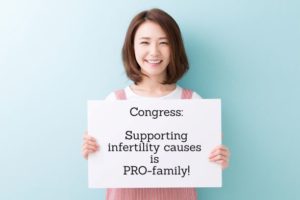What will you say to advocate for change?
 Infertility awareness needs you to become an advocate for change. Help us raise awareness about infertility and the significant lack of access to family building options and emotional support for millions of women and men struggling to build a family.
Infertility awareness needs you to become an advocate for change. Help us raise awareness about infertility and the significant lack of access to family building options and emotional support for millions of women and men struggling to build a family.
National Infertility Awareness Week®, founded in 1989 by RESOLVE: The National Infertility Association, is the largest public awareness campaign that addresses the public health issue of infertility. Their annual observance of infertility awareness occurs for one week every April followed by live advocacy on Capitol Hill in Washington D.C. where advocates meet with our elected officials to push for pro-family legislation.
Make your voice heard
People talking about infertility is at an all-time high. Infertility is not only a medical problem, but social and economic problems as well. Millions of Americans are affected each year by infertility and don’t know how to talk about it or how to pay for it. National Infertility Awareness Week seeks to uncover the issues surrounding infertility, helping us all to make our voices heard and advocate for those struggling with infertility and unable to pay for it.
Become an advocate for change in your community. The more we all know about infertility, the better we are able to talk openly about it, and the more change we will see. We all need to do our part and know the facts about infertility and to advocate for change.
Learn the facts about infertility so you can become an advocate for change.
- 1 in 8 – Approximately one in eight couples are affected by infertility in the United States. That’s about 6.7 million people each year who have trouble conceiving.
- 33% – Percent of American adults who report that they or someone they know has used some type of fertility treatment in order to try to have a baby.
- 20% – Mother Nature’s natural fertility rate is only about 20% per month for a healthy, fertile 30-year-old woman. That means that for every 100 fertile 30-year-old women trying to get pregnant in one cycle, 20 will be successful and the other 80 will have to try again.
- 35 years – Thirty-five is the average age of females when their natural fertility begins to show a marked decline. A woman’s best reproductive years are in her 20s. By age 40, a woman’s natural chance of pregnancy is less than 5% per cycle.
- 30/30/30/10 – Fertility experts agree that, on average, 30% of the cases of infertility they see can be attributed solely to the female, 30% solely to the male, 30% a combination of both partners, and in 10% of cases the cause is unknown.
- 35% – For women experiencing infertility, over one-third can trace their problem back to tubal factors. This includes blocked tubes due to infection or endometriosis, plus factors affecting the peritoneum (lining of the pelvis and abdomen), all fall under this category.
- 25% – Another quarter of all women having trouble conceiving can link their infertility to problems with ovulation, making it one of the most common causes of infertility.
- 40% – In approximately 40% of infertile couples, the male partner is either the sole or a contributing cause of infertility.
- Two-thirds – Approximate percentage of couples going through IVF treatment with zero insurance coverage for therapy.
- 90% – Nearly 90% of infertility cases are treatable with medical therapies such as drug treatment, surgical repair of reproductive organs and assisted reproductive techniques such as intrauterine insemination and in vitro fertilization.
- <3% – While vital for some patients, in vitro fertilization and similar treatments account for less than 3% of infertility services, and about (or approximately) seven hundredths of one percent (0.07%) of U.S. health care costs.
- 1,000,000 – As of 2014, almost one million U.S. babies have been conceived via in vitro fertilization (IVF) since the procedure was developed in the 1980s.
The more we know the facts about infertility, the more we can talk about it and the faster change will happen.


